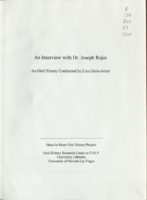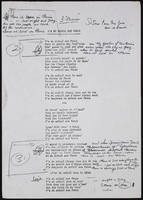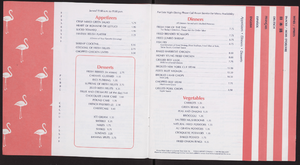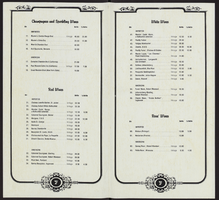Search the Special Collections and Archives Portal
Search Results
Houssels Photograph Collection
Identifier
Abstract
The Houssels Photograph Collection contains color and black-and-white photographs and slides of the Houssels House from 1983. The photographs document the house's original location on Sixth Street in Las Vegas, Nevada, and its subsequent transportation to the University of Nevada, Las Vegas campus.
Archival Collection
Julie McDonald oral history interview
Identifier
Abstract
Oral history interview with Julie McDonald conducted by Michael Richardson on March 14, 1981 for the Ralph Roske Oral History Project on Early Las Vegas. In this interview, McDonald describes life in Las Vegas, Nevada after moving there in 1956, as well as the city's layout. McDonald also passionately describes the complexities, perks, and pitfalls she faced while working as a card dealer in various casinos.
Archival Collection
Steve Johnson oral history interview
Identifier
Abstract
Oral history interview with Steve Johnson conducted by Fred Reagan on March 20, 1978 for the Ralph Roske Oral History Project on Early Las Vegas. In the interview, Johnson discusses his exposure to African American racial discrimination and segregation in Las Vegas, Nevada during the 1950s to the 1970s. He discusses these experiences in markets, theaters, casinos, employment, and in common social interactions. Johnson also discusses the slow progression of social acceptance to racial integration and African Americans entering professional fields.
Archival Collection

Transcript of interview with Dr. Joseph Rojas by Lisa Gioia-Acres, September 30, 2008
Date
Archival Collection
Description
Dr. Joseph Rojas, born 1933 in Alexandria, Louisiana, was the son of Joseph Edward Rojas and wife Carroll. He graduated high school at age 16 and entered Loyola University of the South. Two years later he was accepted at Louisiana State University School of Medicine, graduating with a medical degree in 1957. He interned at Charity Hospital and then completed his OB-GYN residency at Tulane University. Several mentors worked with Dr. Rojas during his residency and he recalls learning surgical and bed-side skills from the likes of Dr. Lynn White and Dr. Fred Janson. He also remembers the very high volume of patients - up to 300 - that he and other residents saw daily. Dr. Rojas married Mona Robicheaux, RN, during his residency and afterwards joined the Air Force. He and his family — they eventually had six children — were stationed at Nellis Air Force Base, arriving in Las Vegas in 1961. He was chief of OBGYN and deputy hospital commander while at Nellis and then served as chief of OBGYN at Southern Nevada Memorial Hospital until 1972. He later served as chief of staff at Women's Hospital and Valley Hospital, and was the first chief of staff at Summerlin Hospital. Dr. Rojas also maintained a private practice outside of the hospital. His wife worked alongside him in his office, and they share memories and anecdotes of the patients they saw and the general atmosphere of the medical community. Both Joseph and Mona agree that Las Vegas hospitals were less racially segregated than the hospitals in Louisiana, and felt that the West was more open to integration. In 1966 Dr. Rojas started the first OB-GYN residency in Nevada, which led to the development of the University of Nevada School of Medicine. He was a researcher, lecturer, teacher, and author. He earned many awards, including the Harold Feikes MD Award for Outstanding Physician in Clark County (2001), and the Nevada State Medical Association Distinguished Physician Award (1980). Dr. Rojas passed away in May of 2009, leaving behind an incredible legacy of service to the residents of Clark County.
Text




